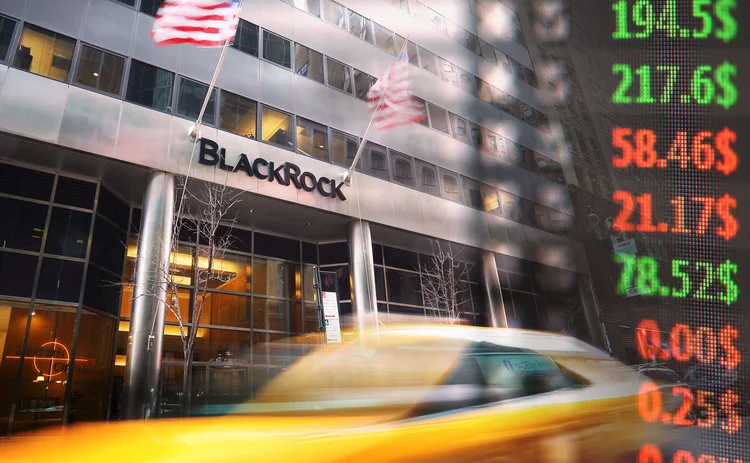BlackRock forecasts return to fixed income amid efforts to electronify market
The world's largest asset manager expects bond markets to make headway once rates settle.

BlackRock executives have predicted a “great reallocation” as investment flows are diverted toward fixed income, suggesting that firms with the technology platforms that cater to increased activity in fixed-income markets are best placed to reap the benefits.
Speaking on the investment giant’s Q3 earnings call, CEO Larry Fink told investors that market conditions favor the relatively low-risk asset class.
“As we approach peak interest rates, we expect a resurgence in fixed-income flows, with clients capitalizing on higher yields,” Fink said.
The Federal Reserve held rates steady in August and September, and investors currently see only a 10% chance of another hike at the next meeting. Recent periods of rate cycle plateaus—including the taper tantrum in 2013 and the Fed pause in early 2019—led to a quick rebound in fixed-income flows.
In addition to the prospect of steady rates, improving long-term bond yields and high volatility are pushing investors to re-think their portfolios.
“We are seeing significant interest levels from a lot of pension funds to bring down their exposure in equities, to bring down their exposure in some components of alternatives, and to focus on income-oriented alternatives to really get an 8%, 9%, 10% coupon return,” Fink said.
The shift toward fixed income was a recurring theme on the earnings call, where BlackRock executives argued that the company is well positioned to capture market share in the reallocation process. Fixed income is BlackRock’s second largest asset class, with assets under management of $2.6 trillion at the end of September.
“We expect that there are going to be some very, very large allocations to fixed income. … And the reason is that today, there are better opportunities to invest in bonds than there have been [over] the years,” said BlackRock president Robert Kapito.
Fixed income is benefitting from a push toward electronic trading that has increased the accessibility of assets and the velocity of bond markets. But there is still a long way to go in some more manual corners of the market: 40% of investment-grade corporate bonds are traded electronically, compared with as little as 10% of municipal bonds.
Bond bonanza
BlackRock is not alone in betting on bonds. A host of big-ticket tie-ups in 2023 have seen trading venues and tech providers double down on their fixed-income offerings.
Most notably, Bloomberg acquired Broadway Technology to open up rates and credits markets and bring connectivity to 50 fixed-income trading venues, while Trading Technologies got fixed-income transaction cost analysis capabilities through the acquisition of Abel Noser Solutions.
For its part, BlackRock hopes to turn its investment management system Aladdin into an end-to-end integrated platform, featuring risk management, performance, data and analytics, and even an accounting function.
The company acquired alternative investment management provider eFront in 2019, and has since integrated it with Aladdin.
“Nearly half of Aladdin’s clients are leveraging our newer offerings, including eFront, which is a true competitive advantage in the tech market,” Fink told investors on the earnings call, adding that the extension of BlackRock’s investment management offering is beginning to be reflected in quarterly revenue.
“Since our acquisition of eFront, revenues have grown nearly 50% while also strengthening our value proposition and positioning in Aladdin and private markets,” Fink said.
He also hinted that the firm was eyeing more technology acquisitions to capture more of the “money in motion” as market participants look to new asset classes and seek more comprehensive investment services. “BlackRock has been a successful acquirer and today advancements in tech and AI, scaling of private markets, and more attractive valuations means BlackRock is once again becoming increasingly engaged in M&A discussions,” Fink said.
In the past five years, BlackRock has spent about $4 billion on mergers and acquisitions, according to CFO Martin Small, who said the firm was not capital constrained.
In particular, Small said that future investments would focus on automation. He emphasized BlackRock’s work with emerging technologies, reminding investors that the firm launched an AI lab in 2018, and has been using natural language processing and machine learning in business processes for 20 years. “We have teams all over these things for how we can scale trading, pricing, operations, client service, and even automation to make our software engineers most productive,” Small said.
Further reading
Only users who have a paid subscription or are part of a corporate subscription are able to print or copy content.
To access these options, along with all other subscription benefits, please contact info@waterstechnology.com or view our subscription options here: http://subscriptions.waterstechnology.com/subscribe
You are currently unable to print this content. Please contact info@waterstechnology.com to find out more.
You are currently unable to copy this content. Please contact info@waterstechnology.com to find out more.
Copyright Infopro Digital Limited. All rights reserved.
As outlined in our terms and conditions, https://www.infopro-digital.com/terms-and-conditions/subscriptions/ (point 2.4), printing is limited to a single copy.
If you would like to purchase additional rights please email info@waterstechnology.com
Copyright Infopro Digital Limited. All rights reserved.
You may share this content using our article tools. As outlined in our terms and conditions, https://www.infopro-digital.com/terms-and-conditions/subscriptions/ (clause 2.4), an Authorised User may only make one copy of the materials for their own personal use. You must also comply with the restrictions in clause 2.5.
If you would like to purchase additional rights please email info@waterstechnology.com
More on Trading Tech
Recent volatility highlights tech’s vital role in fixed income pricing
MarketAxess’ Julien Alexandre discusses how cutting-edge technology is transforming pricing and execution in the fixed income market amid periodic bouts of volatility
Banks fret over vendor contracts as Dora deadline looms
Thousands of vendor contracts will need repapering to comply with EU’s new digital resilience rules
Where have all the exchange platform providers gone?
The IMD Wrap: Running an exchange is a profitable business. The margins on market data sales alone can be staggering. And since every exchange needs a reliable and efficient exchange technology stack, Max asks why more vendors aren’t diving into this space.
This Week: Trading Technologies completes ANS deal; State Street; Equinix; and more
A summary of the latest financial technology news.
Interactive Brokers looks beyond US borders for growth opportunities
As retail trading has grown in volume and importance, Interactive Brokers and others are expanding international offerings and marketing abroad.
JP Morgan’s goal of STP in loans materializes on Versana’s platform
The accomplishment highlights the budding digitization of private credit, though it’s still a long road ahead.
As data volumes explode, expect more outages
Waters Wrap: At least for those unprepared—though preparation is no easy task—says Anthony.
This Week: ICE Bonds and MarketAxess plan to connect liquidity networks, TS Imagine, Bloomberg, and more
A summary of the latest financial technology news.








